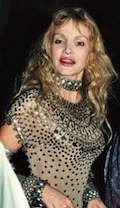The chat began with a question posed by Felix Rohatyn, a former U.S. Ambassador to France: What would Alexis de Tocqueville say if he came back and saw America today? Bernard-Henri Lévy’s reply, given his own admiration for America, was not surprising: Tocqueville “would feel comfortable” except — and it was the big exception — “he might doubt that religion and liberty go hand in hand.” Which of course was what Tocqueville believed nearly two centuries ago in “Democracy in America.”
Speaking last night at the Council on Foreign Relations — one more promotion in an endless round of interviews for his own most recent book, “American Vertigo: Traveling America in the Footsteps of Tocqueville” — Lévy, left, seemed the embodiment of F. Scott Fitzgerald’s remark in “The Crack-Up” that “the test of a first rate intelligence is the ability to hold two opposed ideas in the mind at the same time, and still retain the ability to function.”Many of Lévy’s remarks were restated almost verbatim from previous interviews — for instance, his belief that American Francophobia is a myth, except in the media, where it’s reported as a reality — and some were evidence that he’s more of a first-rate media hog than anything. (We won’t bother with those.) But other remarks, in response to questions from the audience, were fresh.
For one thing, he said he now favors political correctness “in a way I never did, having mocked it before.” For another, he vigorously defended the American press, all its recent mistakes notwithstanding. “I don’t feel the American press is in such bad shape,” Lévy said. “Maybe I’m naive. I don’t believe so.”
Asked about America’s response to the issue of torture in the war on terrorism, he contended that “the American press has reacted more quickly to Abu Ghraib and Guantanamo than the French press did to [torture in] Algeria.” But the prolific Algerian-born author said he was mystified by the slowness of American public intellectuals to express outrage, which he said was much slower in coming than the outrage of French intellectuals on both the left and the right during the Algerian war.
Asked about the anti-Americanism that now grips much of the world, Lévy likened the phenomenon to a magnet drawing various constituencies that are not necessarily allied but which have a hatred for America in common. Further, in answer to a question posed by Financial Times reporter Andrei Postelnicu, who wanted to know why America couldn’t sell itself better, given its ability to sell almost any kind of junk, Lévy asserted that “Anti-Americanism doesn’t depend on what America does or does not do. … It’s a new religion. They don’t hate the worst of America but the very best of it — a free press, equality of women, open debate.”
Earlier, noting that he liked Adam Gopnik’s characterization of him in The New Yorker as “anti-anti-American,” Lévy was at pains to point out that it was far different from, and much better than, being called “pro-American.” (To be pro-American means supporting the death penalty, for instance, which he regards as unconscionable.)
Considering the adulation Lévy has courted and received here, we’d be remiss not to mention Doug Ireland’s take on him. Brother Doug is not impressed:
As someone who lived in France for a decade — where I even once had the unpleasant experience of passing three hours interviewing the arrogant and indigestible egomaniac BHL — I can tell you what most serious intellectuals in France know: that BHL is a fraud and an impostor. … As an assiduous flatterer and intimate friend of business barons, showbiz stars, and political leaders, his conduct is a thousand miles from the “intellectual liberty” of which BHL likes to pose as the lyric defender. His only real talent is his manipulation of a media microcosm without intellectual standards and his endless and skillful self-promotion — the lengths to which BHL and his trophy wife … will go to promote themselves and their obscenely luxurious lifestyle as the incarnation of the “glitterati” is a matter of great hilarity in France.
Postscript: You’ve gotta read Garrison Keillor’s hilarious takedown of “American Vertigo.” It’s the funniest book review I’ve read in years, maybe ever, and certainly the funniest I’ve seen on the cover of The New York Times Book Review. In tomorrow’s edition (1/29), Keillor exposes Lévy as a bombastic writer whose touristic insights are too obvious to be taken seriously. He also provides the perfect bookend for this item, illustrating my reference to Fitzgerald’s remark, but in the negative:
And good Lord, the childlike love of paradox — America is magnificent but mad, greedy and modest, drunk with materialism and religiosity, puritan and outrageous, facing toward the future and yet obsessed with its memories. Americans’ party loyalty is “very strong and very pliable, extremely tenacious and in the end somewhat empty.” Existential and yet devoid of all content and direction. [A] partner-swapping club is both “libertine” and “conventional,” “depraved” and “proper.” And so the reader is fascinated and exhausted by Lévy’s tedious and original thinking.
As was this listener the other night. And let’s not forget: “American Vertigo” would have touched Keillor’s heart if Lévy were a lesbian shepherd from Minnesota who knew how to grab a ram’s balls. See this.

![Bernard-Henri Lévy [Photo: Itzik Edri]](http://www.artsjournal.com/herman/wp/wp-content/uploads/2013/12/Bernard-Henri_Lévy-tau140.jpg)




